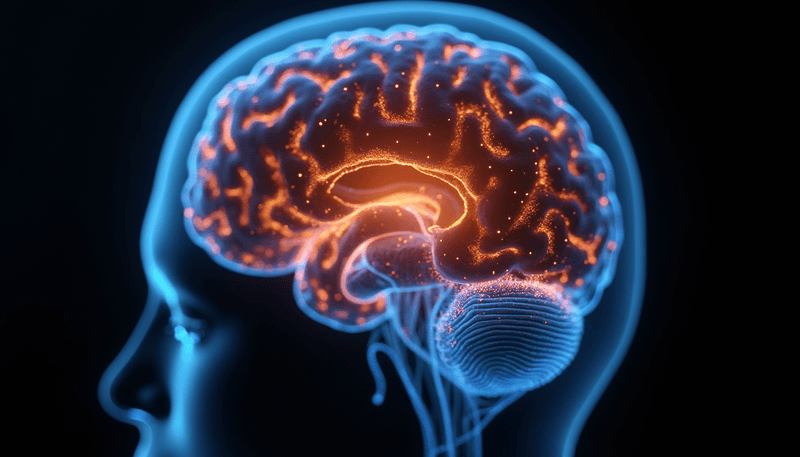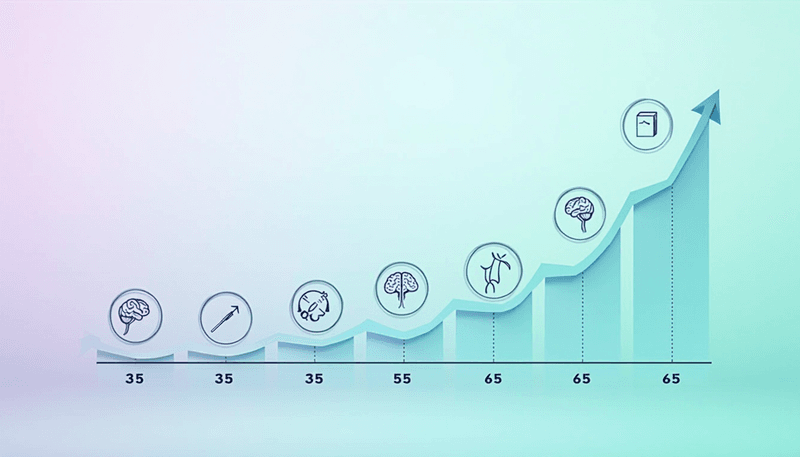Brain Changes During Menopause Finally Explained

Have you ever wondered why your brain sometimes feels different as you approach menopause? You're not alone. A groundbreaking new study has revealed fascinating changes in how our brains adapt to dropping estrogen levels, offering fresh insights into why many women experience shifts in memory and mood during this natural transition.
The Brain's Remarkable Adaptation Strategy
When estrogen levels drop during menopause, our brains don't just passively accept this change. Instead, they actively respond by increasing the number of estrogen receptors - like multiplying the number of "docking stations" available for whatever estrogen remains. This fascinating discovery helps explain why many women experience changes in memory and mood during this time.
"Think of it like a radio trying to catch a weakening signal - it needs more antennas to capture what's available."
This adaptation happens gradually as you move through perimenopause and into postmenopause. The researchers found that certain brain areas, especially those involved in memory and emotion processing, showed the most significant increases in these receptors. This explains why these functions often feel different during the menopause transition.
Timing Matters More Than We Thought
One of the most valuable insights from this research is about timing. The study shows that our brains remain responsive to estrogen-related changes well into the postmenopausal period - up to age 65. This finding supports the concept of a "window of opportunity" for supporting brain health during the menopause transition.
What does this mean for you?
- Start paying attention to cognitive changes early in perimenopause
- Discuss any concerns with your healthcare provider sooner rather than later
- Consider lifestyle modifications that support brain health during this transition
Have you noticed any changes in your memory or mood? When did you first start experiencing them?
Practical Strategies Based on Science
Understanding these brain changes leads to several practical approaches for supporting cognitive health during menopause:
-
Regular Mental Exercise: Since the brain is actively adapting, engaging in mentally stimulating activities can help maintain cognitive function. Consider:
- Learning a new language
- Taking up a musical instrument
- Engaging in strategy games
-
Physical Activity: Exercise has been shown to support brain health and may help manage menopause symptoms. Try:
- 30 minutes of moderate exercise most days
- Combining cardio with strength training
- Mind-body activities like yoga or tai chi
-
Social Engagement: Regular social interaction can help support cognitive function and emotional wellbeing:
- Join a book club or discussion group
- Schedule regular catch-ups with friends
- Participate in community activities
The research highlights that these changes in brain function are a normal part of the menopausal transition. While some women may experience more noticeable changes than others, understanding that your brain is actively adapting can help reduce anxiety about these experiences.
What steps will you take this week to support your brain health during this transition?
This new understanding of how our brains adapt during menopause opens up possibilities for more targeted support strategies. Whether you're approaching perimenopause, in the midst of the transition, or postmenopausal, it's never too late to support your brain health.
I encourage you to start with one small change this week. Maybe it's adding a daily puzzle to your routine, starting a walking program, or scheduling regular catch-ups with friends. Your brain is remarkably adaptable, and supporting it through this transition can make a significant difference in your experience of menopause.
Remember, if you're concerned about changes in memory or mood, discuss them with your healthcare provider. These new research findings may help inform treatment approaches and timing of interventions to better support your brain health through the menopause transition.

Amelia Grace Okonkwo
Amelia Grace Okonkwo is a freelance health writer and author with over 15 years of experience in health journalism, specializing in women's health and autoimmune disorders. With a background in biology and a Master’s in Public Health from Johns Hopkins, she combines scientific accuracy with a storytelling approach to make health information accessible and empowering. Amelia is known for her bestselling book, "The Skin We're In," which explores autoimmune disorders and their impact. She is passionate about delivering practical health insights for women, addressing topics from midlife wellness to mental health.






